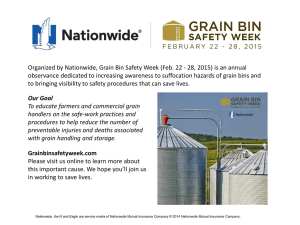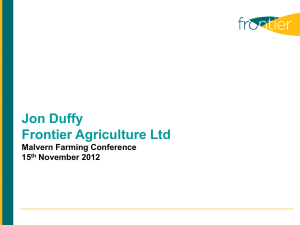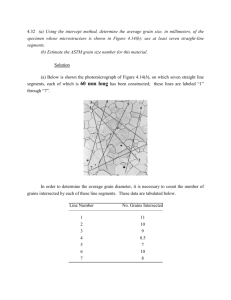Calculation and Story Problem Answers
advertisement
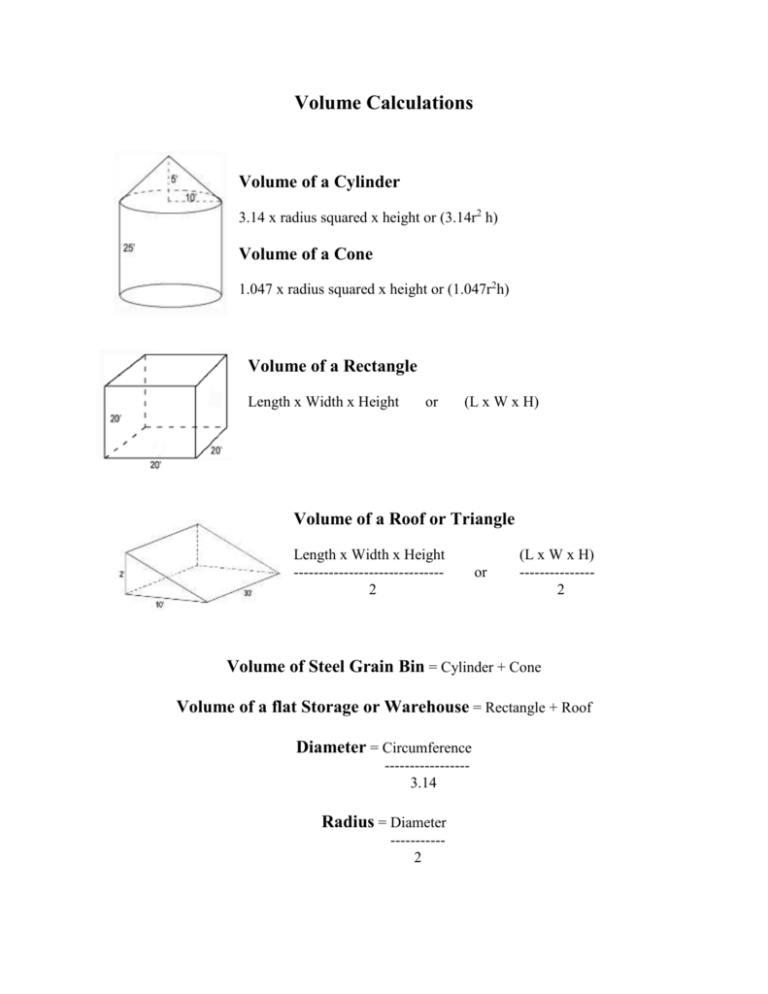
Volume Calculations Volume of a Cylinder 3.14 x radius squared x height or (3.14r2 h) Volume of a Cone 1.047 x radius squared x height or (1.047r2h) Volume of a Rectangle Length x Width x Height or (L x W x H) Volume of a Roof or Triangle Length x Width x Height -----------------------------2 or (L x W x H) --------------2 Volume of Steel Grain Bin = Cylinder + Cone Volume of a flat Storage or Warehouse = Rectangle + Roof Diameter = Circumference ----------------3.14 Radius = Diameter ----------2 Story Problem. An inspector was called out to help an applicator figure out how many phostoxin pellets to place in a grain silo. The silo has an 80’ circumference, 25’ height from eaves to ground, and 5’ high cone. Temperature is 80 degrees F. This silo also contains 500 bushels of grain. 1. Total Volume of Silo? Diameter = 80 / 3.14 Diameter = 25.47 Radius = 25.47 / 2 Radius = 12.73 Cylinder = 3.14 x 12.732 x 25 Cylinder = 3.14 x 162.05 x 25 Cylinder = 12,721 ft3 Cone = 1.047 x 162.05 x 5 Cone = 848.33 cubic ft. Total Volume = 848.33 + 12,721 13,569.33 cubic ft 2. How many pellets need to be used? Page 10 450 – 900 pellets / 1,000 bu withtarp500 bushel 225 – 450 pellets Page 10 150 – 700 pellets / 1,000 ft3 no tarp 2,035 – 9,498 pellets * Ranges with severity of infestation, leaks, etc… 3. How long before aeration? 48 hours Jordon’s Feed Mill Story Problem Jordon’s Feed Mill has a grain silo that is 75’ in circumference and a vertical distance from the eaves to the bottom of the bin of 15’. The cone top is 3’ high. Larry’s Pest Control has been contracted to fumigate one of the silos for the lesser grain borer. The silo is filled with approximately 500 bushels of spring wheat. Larry can either fumigate on Tuesday July 21st in the evening, or Thursday July 23rd in the evening. The weather for Tuesday is forecast to be partly cloudy with a 70% chance of rain and a high of 95 degrees F. Thursday is forecast to be sunny with a temperature of 101 degrees F. The peak grain temperature ranges from 70 – 80 degrees F. There are horses 50 yards from grain silo. Detail your fumigation management plan strategy to include at least the following details. 1. What is the volume of this grain bin? Diameter = 75 / 3.14 Diameter = 23.88 Radius = diameter / 2 Radius = 11.94 cyl = 3.14 x 11.942 x 15 volume = 3.14 x 142.45 x 15 volume = 6,714.74 cubic ft cone = 1.047 x 11.942 x 3 cone = 447.43 cubic ft Volume = 447.43 + 6,714.74 Volume = 7,162.17 cubic ft 2. How many pellets will you need to use when fumigating? Page 10 200 – 900 pellets / 1,000 bu with tarp 500 bushel 100 – 450 pellets Page 10 150 – 700 pellets / 1,000 ft3 no tarp 1,050 – 4,900 pellets * Ranges with severity of infestation, leaks, etc… 3. Calculate the required fumigation period based on fumigant grain temperature? Page 8 48 hr 60 – 80 degrees F grain temperature if sealed properly 4. Which day would be the best one to start the fumigation? Tuesday July 21st because of moisture that afternoon. Moisture will helps convert aluminum or magnesium phosphide into phosphine gas. 5. When should ventilation begin? Thursday evening or Friday morning, < 0.3 ppmillion 6. What personal protective equipment should you wear and how does this relate phosphine gas concentrations? Page 11 - wear dry cotton gloves, wash after, respiratory equipment (NIOSH / phosphine gas approved)-up to 15 ppm 7. Please review the Fumigant Management Plan and fill in the blank fields (with ?).
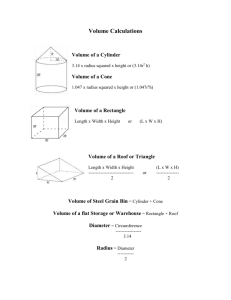
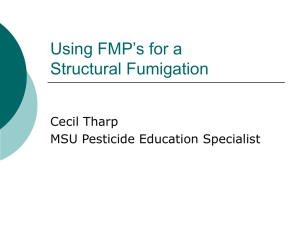
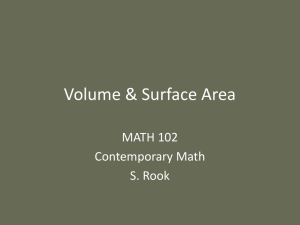
![Volume of Pyramids, Cones, and Spheres [12/4/2013]](http://s2.studylib.net/store/data/005724855_1-4c0eaf218975fc4d9fe792c18193e4dc-300x300.png)
